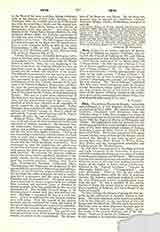

NÈVE, FELIX-JEAN-BAPTISTE-JOSEPH, orientalist and philologist, b. at Ath, Belgium, June 13, 1816; d. at Louvain, May 23, 1893. His parents were devout Catholics. Graduated with distinction from the Catholic college of Lille, Nève completed a course of academic studies at the University of Louvain, obtaining in 1838 the Degree of Doctor of Philosophy and Letters. His pronounced taste for classical and oriental languages led him to pursue higher studies under some of the most distinguished scholars of Europe, Professors Lassen of Bonn, Tiersch of Munich, and Burnouf of Paris. He became acquainted with many oriental scholars, some of them already famous, others destined like himself to win fame in after years. Among these were Muir, Wilson, A. Weber, Kuhn, Max Muller, and the distinguished orientalist and Catholic priest, Dr. Windischmann.
In 1841 Nève was appointed to the chair of Greek and Latin Literature in the University of Louvain, and while teaching the classics, gave a course of studies in the Sanskrit language and literature. This work he kept up with unsparing energy and marked success for thirty-six years, at the same time making known the results of his studies in books and in articles contributed to the “Journal Asiatique”, “Annales de Philosophie Chrétienne”, “Correspondant”, and other periodicals. When in 1877 he was released from his arduous duties with the title of professor emeritus, his industry continued unabated, and for the next fifteen years a series of publications came from his pen. He was a member of the Asiatic Society of Paris, the Asiatic Society of London, the Royal Academy of Belgium, and was a Knight of the Order of Leopold.
To Nève belongs the honor of giving the first impetus to the cultivation of Sanskrit studies in Belgium. The most important of his numerous publications in this field are: (I) his translation of selected hymns from the Rig-Veda, “Études sur les hymnes du Rig-Veda, avec un choix d’hymnes traduits pour le premier fois en françcais” (Louvain, 1842); (2) his fine study of the ancient Brahmin cult of the Ribhanas, “Essai sur le mythe des Ribhanas…avec le texte sanskrit et la traduction française des hymnes addressés a ces divinités” (Paris, 1847); (3) his translation of the Indian drama based on the story of the epic hero Rama, “Le dénouement de l’histoire de Rama. Outtara-Rama-Charita, drame de Bhavabhouti, traduit du sanskrit” (Brussels, 1880); (4) collection of essays on the Vedanta philosophy and the epic and dramatic poetry of India, published under the title “Epoques littéraires de l’Inde” (Brussels, 1883).
Nève was also learned in the Armenian language and literature. A number of valuable translations and studies based on Armenian texts came from his pen. Among these may be mentioned: (I) the Armenian story of the Talar invasion, “Exposé des guerres de Tamerlan et de Schah-Rokh dans L’Asie occidententale, daprès le chronique arménienne inédite de Thomas de Medzoph”, published in “Mémoires de l’Académie Royale de Belgique” (1861); (2) the Armenian accounts of the exploits of Godfrey de Bouillon, “Les chefs belges de la première croisade daprès les historiens arméniens” (Brussels, 1859): (3) the valuable collection of studies on early Christian Armenian prayers and hymns entitled “L’Arménie chrétienne et sa litérature” (Louvain, 1886). Among the publications of Nève bearing on philosophy, a place of honor should be given to his account of learned men who in the sixteenth and seventeenth centuries labored for the upbuilding of the University de Louvain, “La renaissance des letters et lessor de lérudition ancienne en Belgique”.
CHARLES F. AIKEN

